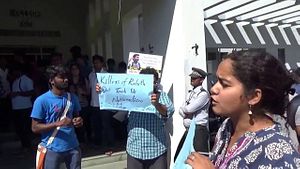On January 17, 2016, at the University of Hyderabad in the Indian state of Andhra Pradesh, a 26-year-old student, Rohith Vemula, committed suicide. Nine months later, a video clip that he recorded days before his death has resurfaced and in its wake sparked discussion on the circumstances of his death, the politics he stood for, and his own identity as a Dalit scholar.
Rohith Vemula, along with four others, had been suspended from the university prior to his death and barred from the premises. In this context, their presence in public spaces and administrative buildings was treated as a criminal act. As members of the Ambedkar Students’ Association (ASA) they had held an event protesting the hanging of Yakub Memon. A student leader from the Akhil Bharatiya Vidyarthi Parishad (ABVP), a prominent group with right-wing leanings, had lodged a complaint against these students, accusing them of violently demanding an apology from him for a Facebook post he put up condemning their event. The university’s board launched an inquiry and recommended strict action that culminated in Rohith’s suspension.
The students as well as all the protesters on their behalf viewed this suspension as an issue of caste-based discrimination. A month earlier, Rohith had written to the university’s Vice Chancellor Appa Rao Podile decrying the caste discrimination on campus, highlighting the plight of Dalit (lower caste) students like him. His ultimate suicide thus sparked a wave of protests and even violent sit-ins and fueled anger, particularly from Dalit students. Protesting students specifically accused Bharatiya Janata Party (BJP) members Bandaru Dattatreya and Smriti Irani of putting pressure on the university to punish the five students. As the then-Minister of Human Resource and Development Smrit Irani constituted a one-man judicial commission 11 days after his death to probe the circumstances surrounding it.
If the commission had found this to be an instance of caste-based discrimination, legal action against all the accused would have had to be taken as per the strict requirements of the SC/ST (Atrocities) Prevention Act. This also means that the court would have had the freedom to assume that the accused was aware of the victim’s caste identity, unless it was explicitly proven otherwise.
The AK Roopanwal Commission submitted its findings in a 41-page report this August. It cleared the names of the ministers, declaring that they were merely carrying out their “duties as public servants.” Further, it found that the administration was not politically motivated and attributed his suicide to personal frustration rather than caste-based discrimination. It further actively questioned his identity as a Dalit, stating that it found no proof that Rohith’s mother, Radhika, even belonged to the “Mala” Dalit community.
His family has reacted angrily to these findings, alleging that they attempted to shield those involved in his decision to commit suicide. Radhika Vemula has said that she is determined to launch an independent campaign against the BJP along with other activists, as she feels maligned by the report which accuses her of branding herself in a manner that gave her son caste based benefits.
His brother Raja Vemula has forcefully pointed out that the National Commission for Scheduled Castes has certified his mother as belonging to the Hindu Mala caste, which has Scheduled Caste status in Andhra Pradesh. The family questions an independent commission’s right to contest their self identified and certified caste and even argues that this is tantamount to ignoring the discrimination that Radhika Vemula has faced by virtue of her Dalit status. The released video of Rohith, filmed days before his death, has been offered by his friends as direct rebuttal to the aspersions cast by the commission. They have said that they could only access it now from his laptop, which was seized during arrests earlier in March. In the video, he asserts his identity as the Dalit from Guntur, and speaks of the treatment meted out to him during suspension, the history of his disagreements with the ABVP, and his ability to secure a seat through the General category, rather than a caste-reserved category, because of a Junior Research Fellowship he was awarded.
The posthumous video rebuttal offered by Vemula contends with important questions – what are the politics of questioning the very identity that Vemula espoused? By casting aspersions on his Dalit status, the commission does not just relax the potential legal implications of the accused in the case of his suicide, it also belittles the history of discrimination that Vemula alluded to and ultimately attributed to his death.
Despite ABVP opposition, an Udaipur Film Festival was conducted with a demand for justice for Vemula as part of its theme. Protests have erupted at the university, calling the commission politically motivated. Earlier this month, Sunkanna, another student suspended along with Vemula, refused to accept his doctorate degree from VC Appa Rao who has been reinstated at the University and resumed his duty in March. While another official awarded it instead, in the simple act of refusing to acknowledge Appa Rao’s legitimacy, Sunkanna sent out a strong message — a reminder that larger political forces that attempt to dismiss or question Rohith’s narrative, cannot actually change the truth.

































